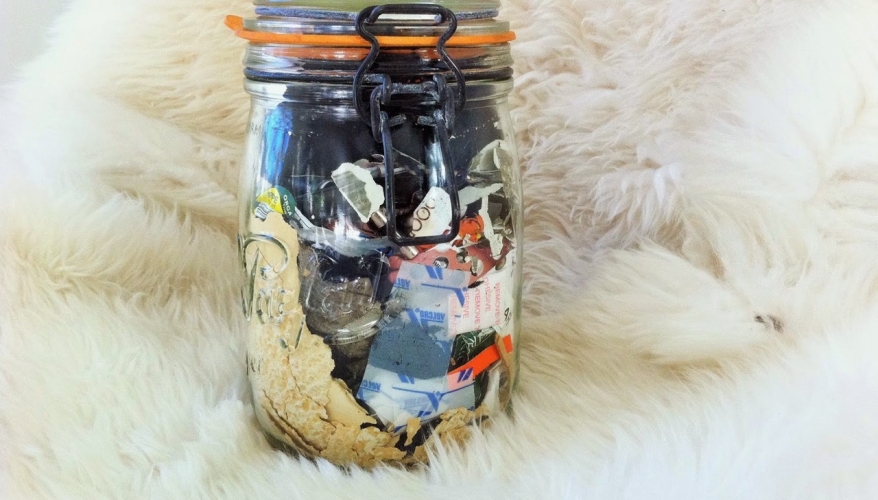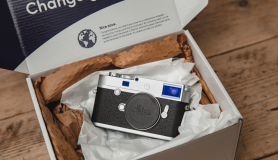1. RECYCLING AND COMPOSTING I have turned what used to be our rubbish bin into a big compost keeper. This ensures composting is easy and within reach of the whole family. It gets emptied into a container on a weekly basis for our city rubbish team to pick up. The only food that we buy in packaging is butter. We buy the kind that is wrapped in a compostable wax paper. I once collected our butter wrappers for four years and made an art piece; it really opened our eyes to how much butter we use! Another bin is for recycling: we get our wine refilled at a local winery but recycle the bottles that guests bring into our home. And we also have a jar under the sink to collect our yearly rubbish.
2. SWAP DISPOSABLES FOR REUSABLES I do not buy single-use products – paper towels, bin liners, greaseproof paper, aluminum foil, disposable plates, cups, etc… They’re not worth it. They deplete resources, they take time to purchase and dispose of; they’re a waste of my hard-earned money (I prefer to spend it on family activities instead). I swapped paper towels for reusable rags, I chose cotton over microfibre because microfibre release tiny synthetic materials that end up in the watershed and subsequently sea life! I no longer use disposable sandwich bags, we wrap our lunch in kitchen towels instead (I made a bunch from an old French linen sheet). We dropped bin liners all together, the wet items in waste are mostly compostable anyway. If you don’t buy these disposable products, you will realize that you can very easily live without them. Try it for a while.
3. STORING We use Kilner-style jars for canning, storing, freezing, transporting, etc.; they are versatile and interchangeable, I just love them. I no longer have to worry about the detrimental effects on our health of plastic leaching into our food. I also keep accessories and kitchen gadgets to a minimum. I have only kept strong, metal, essentials. The stronger and the less you have, the less will break, the less will end up, well… you know where. We own just two small electrical appliances: a toaster, and an immersion blender. I reuse the back of school printouts for shopping and errands lists, and write on them with refillable stainless lead holders.
4. BUY IN BULK I buy food in bulk or at the counter from my local health food store, I bring reusable bags and jars for oils, vinegar, dry goods, spices, nuts, meat, fish, cheese, olives, etc. This means no disposable or recyclable food packaging. Very little of what goes into the recycling actually gets recycled anyway. I have learned to make the most of what’s available to me unpackaged in that store: I buy buns and cookies from the loose bakery bins, pickles and olives from the salad bar, orange juice from the orange squeezing machine (so good!). I order ten freshly baked baguettes (enough to last us a week) from the bakery and have them placed into my large bread bag (a pillowcase). At home, I cut them in half and freeze them in another pillowcase.
5. CLEANING THE KITCHEN We eliminated the need for sponges by using the washcloths mentioned above (to wipe counters), a compostable wooden cleaning brush with natural hair (to scrub dishes), and a metal scrubby (to scrub baked-on food off the stovetop) instead. I use bulk castile soap by Dr. Bronners as a multipurpose cleaner (hands, dishes, floor, dog) and sometimes bulk baking soda as a mild scrubber (to remove scuff marks on my hardwood floors, for example).
6. SHOP AT THE MARKET When my work schedule allows, I buy produce (I bring reusable mesh bags) and get my egg carton refilled at the farmer’s market – there, produce is sold loose, no stickers, plastic ties or elastic bands on it. And all are in season! Before the end of the tomato season, I buy a couple of totes full of them, make sauce, and can enough to last us until summer (instead of buying store-bought cans, most of which are lined with BPA).
7. DRINK TAP WATER We drink yummy tap water and each one of us has dedicated stainless steel bottles: They’re not only great to travel with but they also have eliminated the tons of empty dirty glasses that I used to find on my counter.
All of this might seem like a lot of work, but much of the Zero Waste lifestyle is about living simply, going back to basics, which save time and money in the long run! If you start small, one step at a time, you’ll be hooked. One small resolution to yourself such as: ‘I will not bring another plastic bag into this house’… will lead to another and before you know it, you’ll be ready to move on to another room.
MORE INSPIRATION
EXPLORE Bea’s inspirational lifestyle at zerowastehome.com.
READ Zero Waste Home: The Ultimate Guide to Simplifying Your Life (Penguin) for more advice and easy to implement tips.
FOLLOW Watch out for Bea’s suggestions on how to entertain zero waste style in our next issue.







